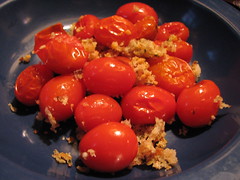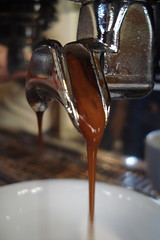I never used to be a food person.
I mean, I ate food, but that was mostly because you have to in order to survive. And I would occasionally even make food, but it usually came out of a box and one of the main ingredients was typically dehydrated cheese product. And I mean, I always liked food—especially dehydrated cheese product–based food!—but no one in my family was especially culinary or concerned with how food can really affect your quality of life. We weren't exactly health-food people.
For instance, I was introduced to whole wheat bread by my girlfriend when I was 22 years old. And I thought she was just being a hippie! Seriously!
But learning more about coffee and being so inspired by its journey from crop to cup has completely altered the way that I think about all food, and that is one of the greatest gifts this crazy job and this beautiful industry has given me.
Every single time I explain the life cycle of a specialty-coffee bean—how long it takes for a plant to start producing cherry, how a single tree will have its cherry picked and picked again as they ripen over the course of several weeks, how the coffee is milled, how much of the work is done by hand—I think about the countless other things that we consume (without giving it much thought) that arrive to us in kind. Oranges, peanuts, rice, apples, wheat, leafy greens, corn—it's so overwhelming and awe-inspiring.
I decided at some point to stop taking food so for granted, and I have coffee to thank for that almost entirely. (Well, coffee and my undying love for Martha Stewart…) It has changed my life unbelievably.

Cherry tomato crisp from Everyday Food. It was delicious.
Just as how I stopped accepting my parents' preground, freezer-stored, no-roast-on-date coffee in my daily life in favor of sustainably traded and freshly roasted whole beans, I am now concerned with buying local, buying organic, buying ripe and preparing fresh myself—not "cooking" instant ramen every night or eating white-bread and American cheese sandwiches. I think about where a food is from before it goes in my pan, on my plate or in my mouth. And just like when I started to learn about great-quality coffee and how to prepare it well, my life is improved by learning more about food and how to prepare it. I have more control over my body and my health, I feel better about myself, I feel able to provide for myself and my husband, I can support farmers whose growing practices I believe in, and I can reclaim eating out as a special treat to be savored, not a daily necessity and anxiety.
Why do I bring this up? Because lately I've been thinking so much about how we craft a language around coffee in attempt to make it more accessible to the average person. So often I've used the wine analogy, and that's been helpful to a point. Although… I personally don't know anything about wine except that I like it? As I stood in an organic market today handing out tiny cups of free iced coffee, I got to glance at the expensive farmer cheese and organic bing cherries in people's baskets, though these were often the people who balked at "expensive" coffee compared with the market's proprietary blend.
I'm a bit late on this train, I know. The Slow Food thing is blazing and everybody is talking about artisinal and hand-crafted and I'm stuck in 2004 with the wine analogy. But I was also stuck in 1976 with my American cheese thing, so maybe you'll cut me a break.
How have you found it most effective to talk to people about coffee? What's your hook? How can I be better at this? Help me, coffee people. Help me while I go eat this amazing cherry tomato crisp (the recipe for which, by the way, calls for white sandwich bread, which I don't eat anymore. So I used flax-quinoa bread instead!).

